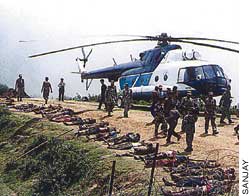 Despite having the support of foreign countries such as India, the United States and the United Kingdom [for the emergency], Prime Minister Sher Bahadur Deuba dissolved parliament after failing to win the support of his own party to extend the state of emergency. This indicates that foreign powers are more influential than domestic ones in regard to the running of the state.
Despite having the support of foreign countries such as India, the United States and the United Kingdom [for the emergency], Prime Minister Sher Bahadur Deuba dissolved parliament after failing to win the support of his own party to extend the state of emergency. This indicates that foreign powers are more influential than domestic ones in regard to the running of the state. Since the Maoists have established their power in the last six years-resulting in a state of emergency since November 2001-it has become important for the world to be alert about what is happening in Nepal. The 11 September attack by bin Laden's al-Qaeda on the US has made it clear that sparks ignited by terrorists can spread to any place in the world.
That's why top American [army] brass used the visit of the US Foreign Secretary [Colin Powell] to inspect Maoist areas. Top-ranking Indian army officials also visited these areas prior to the visit of the Indian Army Chief Padmanaban, and the British army chief, too, visited these areas. Last but not least, the Chinese ambassador, who is all for peaceful diplomacy, also inspected some Maoists-affected districts. He made it clear that the activities taking place in a bordering state were of concern to the Chinese. His concern is justified if elements engaged in spreading unrest in Nepal were to cross the border into Chinese territory. That's why China is prepared to help Nepal solve her internal problems.
There's a symbolic meaning, too. Nepali Prime Minister Sher Bahadur Deuba has tried to improve ties with Britain and the US. The Americans have indicated that they are interested not only in assisting Afghanistan but, if need be, providing troops to settle the Pakistan and India conflict over Kashmir. if this were to happen, there is a possibility that Nepal could be used as a base. However, the US envoy to Nepal has reiterated that this is not his country's intention. As India and the US come closer on the Kashmir issue, China is worried that the issue of a free Tibet might be ignited. And that is why China is interested in peace and stability in Nepal.
It is important for Nepal to decide whether to allow supportive countries such as the US, the UK and India to have free rein in Nepal or to only use the support that it needs. Both India and China are finding it difficult to digest Nepal's increasing closeness to the United States. If powerful nations are allowed to make Nepal their playground, it is not clear what diplomatic price Nepal will have to pay. There is speculation that Nepal's politics will be much clearer following Their Majesties' upcoming visits to India and China.
A certain section feels that the elections and other activities will fail unless the Maoists are brought into the mainstream. If elections were to take place, and parliament were formed, it would be a majority parliament, which exists even now. It doesn't make sense to dissolve parliament. The security forces will continue to be mobilised in the same manner as they are now, since there is no possibility of adding forces. However, the Maoists, in that period, will have learnt how to check the security forces. Unless they are given a political option, development will come to a standstill, given that they are destroying infrastructure.
So following Their Majesties' visit to India, there will be an attempt to bring the Maoists into the mainstream. The Maoists seem to be ready to drop their demands for a republic and a constituent assembly, and settle for a model democracy and a monarch. They appear to be ready to join an interim government and to fight elections, because it is becoming difficult for India to provide them protection in the face of improving relations between India and the United States. That is why a certain sector feels that once the king returns from China, the present government, owing to its inability to maintain peace and security, will be replaced by an all-party interim government that will work on amending the constitution.


